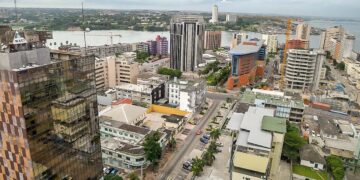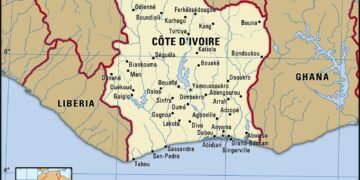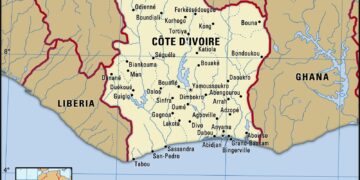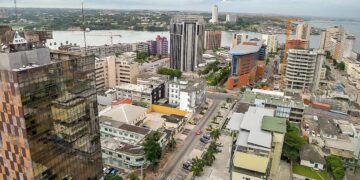In Côte d’Ivoire’s bustling economic capital of Abidjan, a humanitarian crisis continues to unfold as thousands of families grapple with the aftermath of forced evictions. Despite promises of support from authorities, many of these individuals remain in limbo, vulnerable and without adequate resources. An alarming report from Amnesty international highlights the plight of these communities, shedding light on the dire circumstances they face and the urgent need for governmental accountability and thorough support measures. As residents navigate the challenges of displacement and loss,the call for action grows louder,demanding immediate attention to the protection of their rights and dignity. This article delves into the grim realities faced by affected families and examines the implications of a failure to address these urgent issues.
Côte d’Ivoire Faces Humanitarian Crisis Following Forced Evictions in Abidjan
The recent forced evictions in Abidjan have left thousands of families in dire situations, prompting urgent humanitarian concerns. Many residents were uprooted from their homes without adequate notice or compensation, leading to widespread dislocation and instability. Victims of these evictions are struggling to access basic necessities such as food, water, and medical care. The impact of these actions is felt not only in the immediate loss of shelter but also in the long-term psychological and social ramifications for the affected communities.
Organizations like Amnesty International are calling for immediate measures to address the plight of those displaced. Key demands include:
- Provision of Emergency Housing: Immediate shelter solutions for families rendered homeless.
- Access to Basic Services: Ensuring displaced individuals can access clean water, food, and healthcare.
- Legal Redress: Offering support for individuals seeking justice for their unlawful evictions.
Efforts must be coordinated to ensure that vulnerable populations are not just left to fend for themselves in the wake of governmental actions that infringe on their rights. The international community’s involvement is crucial for raising awareness and mobilizing resources to alleviate this ongoing crisis.
Understanding the Background of the Forced Evictions in Abidjan
the recent wave of forced evictions in Abidjan has sparked widespread outcry, as thousands of families find themselves displaced without adequate support. These evictions are largely attributed to the government’s ongoing urban growth initiatives aimed at modernizing the city and addressing issues related to overcrowding and informal settlements. However, these actions have often been executed without prior consultation or compensation, leaving many residents vulnerable. The implications of these evictions are profound, exacerbating existing socio-economic disparities and creating a humanitarian crisis within the urban landscape.
This situation has brought attention to several key issues surrounding urbanization in Côte d’Ivoire:
- Lack of Legal Protections: Many residents remain unaware of their rights, leading to exploitation during the eviction process.
- Government Accountability: There is growing pressure for the government to provide clear and fair compensatory measures for affected families.
- Human Rights Concerns: Organizations like Amnesty International highlight the necessity of upholding human rights in the context of urban planning.
Impact of Forced Evictions on Vulnerable Communities
The recent forced evictions in Abidjan have left thousands of families grappling with severe repercussions. Individuals and communities who were already vulnerable now find themselves in a precarious situation, their homes destroyed and livelihoods disrupted. the lack of adequate support measures has exacerbated the challenges faced by these families, pushing them further into poverty and insecurity. Key impacts of these evictions include:
- Displacement: Many families have been uprooted from their communities, making it difficult to access essential services like education and healthcare.
- Social fragmentation: Evictions disrupt community ties, leading to increased social isolation and loss of support networks.
- Economic instability: Loss of housing often translates to loss of income, particularly for those who operated small businesses from their homes.
the situation is compounded by a lack of legal assistance and advocacy for the affected populations, who often do not understand their rights or available resources. Without immediate action from the authorities, the cycle of disadvantage is likely to persist. A closer examination of the demographic composition affected reveals stark inequalities:
| Community Group | Population Affected | Primary concern |
|---|---|---|
| Women-headed households | 35% | Food security |
| Children | 50% | Access to education |
| Senior citizens | 15% | Healthcare accessibility |
Testimonies from Affected Families: Stories of Loss and Desperation
The stories emerging from the recent forced evictions in Abidjan reveal a profound sense of heartbreak and urgency among affected families. One mother,Aminata,recounted the devastating moment she lost her home of over a decade,where her children had grown up. “We came home to find our belongings on the street,” she lamented, her eyes filled with tears.Many families, like Aminata’s, are grappling with not only the loss of shelter but also the destruction of their livelihoods. They now live in temporary shelters, struggling to meet basic needs without support.
Across the city, families are unified in their call for action and acknowledgment of their plight. Many have formed community groups to navigate the challenges that have arisen in the aftermath of these evictions. Their collective experiences include:
- Loss of income: Many breadwinners are unable to find work due to their unstable living conditions.
- Health crises: Lack of access to clean water and sanitation has exacerbated health issues.
- Psychological trauma: Families report heightened anxiety and depression stemming from their sudden displacement.
Amid this backdrop of despair, they reiterate the urgent need for government intervention and assistance. Affected families have documented their grievances through letters and local media outreach, seeking to ensure that their stories are heard and their rights are respected. They demand not just temporary housing,but a comprehensive plan for restoring dignity and security to those impacted by these tragic evictions.
The Role of Government in Addressing housing Rights Violations
The responsibility of governments to safeguard housing rights is paramount, especially in the wake of forced evictions. In Côte d’Ivoire, the state’s failure to protect vulnerable populations following these events highlights important shortcomings in policy and implementation. The government should prioritize the protection of its citizens by ensuring that proper mechanisms are in place to address the needs of those displaced. this can include:
- Establishing legal frameworks that support housing rights.
- Implementing social support programs to assist families affected by evictions.
- Conducting thorough impact assessments before any displacement occurs.
- Facilitating inclusive dialog between stakeholders, including affected communities.
Moreover, governments must actively engage in monitoring and accountability processes to prevent housing rights violations from occurring. This requires a commitment not just to reactive measures, but also to proactive strategies that prioritize housing as a fundamental right. Strategies could involve:
| Action | Description |
|---|---|
| Regular Audits | Monitor compliance with housing rights legislation. |
| Community Engagement | Involve local communities in decision-making processes related to housing. |
| Emergency Response Plans | Develop rapid response measures for families facing imminent eviction. |
Amnesty International’s Findings on Eviction Procedures
amnesty International’s latest report highlights the troubling reality faced by many families in Abidjan following a series of forced evictions that have left thousands displaced. The organization underscores the urgent need for the government to implement adequate support measures to assist those affected.A significant finding shows that many of the evicted families are surviving without basic necessities, further exacerbating an already dire humanitarian situation. Residents reported a lack of dialogue from authorities, with minimal or no prior warning about impending evictions, leading to profound distress and uncertainty within communities.
The findings suggest systematic violations of human rights related to eviction procedures,including the failure to provide just compensation or alternative housing solutions.Among the key issues identified are:
- Inadequate Housing Solutions: Many families remain without access to basic shelter.
- Health Impacts: Displacement has triggered health crises due to exposure and lack of resources.
- legal Challenges: A significant number face barriers to seeking legal recourse or assistance.
Furthermore, Amnesty International has called for vital policy reforms to ensure that all evictions are conducted legally and ethically, respecting the rights of affected persons. A comprehensive strategy to address this ongoing crisis is essential to safeguard vulnerable populations in Abidjan and restore their dignity.
Urgent Need for Comprehensive Support Measures
As the dust settles in the neighborhoods of Abidjan, it becomes increasingly clear that urgent intervention is necessary for families who have been displaced by recent forced evictions. Despite government assurances, thousands remain in limbo, struggling to secure basic necessities like food, shelter, and medical care. The psychological toll on affected families is compounded by a lack of clear communication from authorities. This situation exacerbates existing vulnerabilities, particularly for women and children who bear the brunt of such displacements.
The call for a comprehensive support framework is more than a plea; it is a lifeline for those impacted. Essential measures should include:
- Immediate access to temporary housing solutions
- Provision of psychological support services
- Food and water distribution initiatives
- Employment assistance programs for displaced individuals
Moreover, the establishment of community centers could serve as hubs for resources and details, helping families navigate their new realities. Transparency and a collaborative approach with NGOs, community leaders, and affected families will be crucial in ensuring that support measures meet the actual needs of those impacted by these displacements.
Health and Well-Being Risks for Displaced Families
Displaced families in Abidjan face a myriad of health and well-being risks that considerably undermine their quality of life. Living in temporary shelters without access to basic sanitation and clean water exposes these families to heightened risk of disease. The cramped conditions often facilitate the spread of communicable diseases, while limited access to healthcare services means that even minor illnesses can escalate into serious health threats. The psychological impact of forced evictions contributes to increased levels of anxiety and depression among adults and children alike, further complicating their ability to secure stable livelihoods and access essential services.
Moreover, the disruption of social networks as families are uprooted from their communities exacerbates the situation, leading to feelings of isolation and helplessness. Vulnerable groups, particularly children and the elderly, are at an even greater risk, facing neglect and potential violence in these unstable environments. The lack of adequate mental health support exacerbates the stigmatization these families endure,causing a cycle of despair that limits their ability to rebuild their lives. Immediate intervention is crucial to address these health challenges and provide adequate support systems to foster resilience among displaced populations.
Long-Term consequences of Inadequate Housing Policies
The recent forced evictions in Abidjan serve as a stark reminder of the far-reaching impact of inadequate housing policies. The immediate consequences are glaring: thousands of families find themselves displaced and in precarious living situations, struggling to provide basic necessities for their children.However, the long-term implications can be even more detrimental to individual lives and communities. Families without stable housing often face a cycle of poverty that is difficult to escape, leading to greater social challenges such as increased crime rates, deteriorating health conditions, and lower educational outcomes for children. Housing instability not only disrupts communities but also strains public resources as local governments struggle to meet the rising demand for social services and support systems.
Moreover, inadequate housing policies can exacerbate existing inequalities within society. Vulnerable populations—such as low-income families, migrants, and marginalized communities—are disproportionately affected. Over time, the lack of robust housing frameworks can lead to social fragmentation, where communities become polarized, reducing social cohesion and trust among residents. Long-term neglect in addressing housing issues can foster resentment toward authorities and inhibit civic engagement. As Abidjan navigates these challenges, it becomes imperative for policymakers and stakeholders to investigate enduring housing solutions that not only address current needs but also anticipate future demands to create resilient, inclusive urban environments.
international Human Rights Standards and Côte d’Ivoire’s Obligations
Côte d’Ivoire is bound by several international human rights instruments that require the government to uphold the rights of its citizens, especially the most vulnerable. Key obligations include the protection against forced evictions, ensuring adequate housing, and providing effective remedies for those affected by such actions. These standards, enshrined in treaties such as the International Covenant on Economic, Social and Cultural Rights (ICESCR) and the African Charter on Human and Peoples’ Rights, affirm that everyone has the right to an adequate standard of living, including adequate housing, and should not be arbitrarily deprived of their homes.
Despite these clear obligations, the ongoing situation in Abidjan reveals a troubling gap between legal commitments and actual practise. Many families displaced by forced evictions remain without essential support, facing uncertainty and hardship. The government must take decisive steps to align domestic policies with its international obligations by:
- Establishing clear guidelines to prevent arbitrary evictions.
- Providing immediate relief and long-term rehabilitation plans for displaced families.
- Engaging in meaningful dialogue with affected communities to assess their needs and concerns.
Recommendations for the Ivorian government
the government must prioritize the establishment of a comprehensive support framework to address the urgent needs of families displaced by forced evictions.It is crucial that the government:
- Institute a clear policy for fair and just compensation for those affected, ensuring that it aligns with international human rights standards.
- Develop social housing initiatives that provide affected individuals with secure and affordable living options.
- Engage in community consultations to involve local stakeholders in decision-making processes regarding urban development and housing policies.
Moreover, an self-reliant commission should be established to monitor and evaluate the treatment of displaced families. This commission could:
| Recommendations | Expected Outcome |
|---|---|
| Conduct regular assessments | Identify the needs of displaced families and reccommend targeted support measures. |
| Ensure transparency in housing policies | Build trust with communities and prevent future conflicts. |
| Facilitate public awareness campaigns | Educate displaced individuals about their rights and available resources. |
The Importance of community Engagement in Resettlement Strategies
Effective community engagement is a cornerstone in crafting robust resettlement strategies, particularly in the aftermath of forced evictions. In Côte d’Ivoire’s bustling capital, where thousands of families have been uprooted, involving affected communities in the decision-making process can significantly enhance the outcome of resettlement efforts. By including local voices, authorities can better understand the unique needs and aspirations of displaced individuals.This engagement can lead to tailored support measures that not only facilitate a smoother transition but also empower residents to rebuild their lives with dignity.
Furthermore, active participation fosters a sense of ownership among community members, encouraging collaboration and cohesion. When families are given the prospect to express their concerns and contribute to planning, it helps build trust between them and resettlement authorities. Some essential aspects to consider in this participatory approach include:
- inclusive dialogue: Ensuring that all community segments, including women, youth, and marginalized groups, are represented.
- transparency: Sharing information openly about resettlement plans and timelines to avoid misunderstandings.
- Feedback mechanisms: Establishing channels for community members to voice their feedback and grievances throughout the process.
Such initiatives could not only alleviate the hardship faced by displaced families but also create an habitat conducive to social stability. Building a resilient community through engagement can ultimately transform the challenges of forced displacement into an opportunity for empowerment and growth.
Strengthening Legal Protections for Housing Rights
The recent incidents in Abidjan highlight a critical gap in the legal framework governing housing rights, underscoring the urgent need for enhanced protections. As thousands of families remain displaced and without adequate support following forced evictions, it is imperative that the Ivorian government revisits its housing policies. Legal reform should prioritize the establishment of clear guidelines for eviction processes, ensuring that they adhere to international human rights standards and are accompanied by viable alternatives for affected populations. Concrete measures must also be implemented to prevent arbitrary evictions and safeguard the rights of vulnerable communities.
Furthermore, building a robust legal architecture involves not only reactive measures but also proactive initiatives to foster secure housing. Key components of a strengthened legal protection system should include:
- Access to Legal Assistance: Ensuring that affected families have the right to legal portrayal during eviction processes.
- Compensation Mechanisms: Establishing fair and timely compensation for displaced families,recognizing their loss of home and livelihood.
- Tenant Protections: Enacting laws that safeguard tenants from unjust eviction and discrimination based on their socio-economic status.
- Community Engagement: Involving local communities in the decision-making process regarding housing developments to reflect their needs and rights adequately.
Call to action: Mobilizing Local and Global Support
It is imperative that both local and global communities unite to bring attention to the plight of those affected by forced evictions in Abidjan. Immediate action is required to provide essential support and advocacy for the thousands of families whose lives have been disrupted. Join us in calling for the following actions:
- Raise awareness: Share stories, experiences, and factual information about the consequences of these evictions through social media platforms and community events.
- Support local organizations: Contribute to local NGOs that are actively working to assist displaced families in finding shelter, food, and legal representation.
- Contact decision-makers: Reach out to local and international officials, urging them to prioritize the issue and implement policies that protect vulnerable communities.
Moreover, it is indeed crucial for the international community to lend their voice and resources to this pressing humanitarian crisis. By mobilizing hashtag campaigns,organizing petitions,and staging peaceful demonstrations,we can create a ripple effect that transforms awareness into actionable change. Take part in collaborative efforts by:
- Sign petitions: Stand alongside affected families by endorsing petitions that demand justice and support from governing bodies.
- Participate in fundraising events: Contribute to or organize charity events aimed at raising funds specifically for displaced families.
- Engage with media outlets: Help amplify the narrative by writing letters to editors or participating in interviews that focus on this urgent issue.
The Path Forward: Ensuring Justice for Affected Families
The recent forced evictions in Abidjan have left thousands of families grappling with uncertainty and despair. It is crucial to implement immediate support measures to assist these vulnerable populations. For this purpose, the following actions must be prioritized:
- Financial Assistance: Establish emergency funds to aid those displaced, ensuring they can secure basic necessities.
- Housing Solutions: Develop a transparent plan for temporary and permanent housing options that respect the rights of the evicted families.
- Legal Support: Provide access to legal resources that will help families challenge their evictions and seek reparations.
- Community Engagement: Involve affected families in decision-making processes to create solutions that meet their needs and restore their dignity.
Moreover, it is indeed essential for the government and relevant authorities to establish a comprehensive framework that addresses the underlying issues leading to such evictions. This could include:
| Key Focus Areas | Implementation Strategies |
|---|---|
| policy Reform | Revise land tenure laws to protect against arbitrary evictions. |
| Stakeholder Collaboration | Coordinate efforts with NGOs and community organizations to enhance support efforts. |
| Awareness Campaigns | Educate the public on housing rights and available recourse options. |
Addressing these critical aspects can pave the way for justice, helping families rebuild their lives and ensuring that similar injustices do not occur in the future.
Key Takeaways
the ongoing plight of thousands of families in Abidjan,Côte d’Ivoire,underscores the urgent need for effective intervention and support from governmental authorities and humanitarian organizations. As documented by Amnesty International,these forced evictions have not only stripped individuals of their homes but have also left them in a vulnerable state,grappling with uncertainty and loss. The urgent call for assistance is clear: systemic changes must be implemented to safeguard the rights of the most marginalized communities, ensuring that their voices are heard and their needs addressed. As we continue to monitor the situation, it is vital to remain engaged and advocate for sustainable solutions that prioritize the dignity and welfare of all residents in Côte d’Ivoire.















